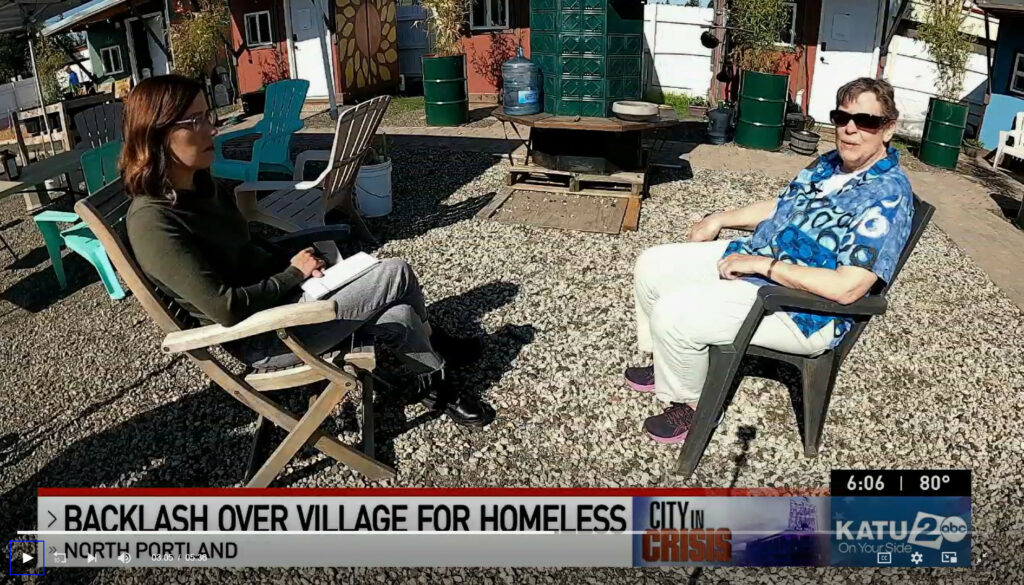https://katu.com/news/homeless-crisis/backlash-erupts-in-north-portland-over-tiny-village-weshine-for-the-homeless
PORTLAND, Ore. — Susan Landauer isn’t tiptoeing around what is arguably Portland’s most sensitive subject: how to help the homeless.
“I’m an old lady. I’m scared of these people,” said Landauer. “They are abusing drugs and alcohol, and I don’t want them in my yard.”
Many of Landauer’s neighbors, including Mary McClain, are right there with her.
“Safety is the number one concern,” said McClain. “And probably the second concern is property values.”
They live in the Portsmouth neighborhood, right near an empty parking lot behind St. Andrew’s Episcopal Church, where six months from now, a tiny village for the homeless will likely fill the space.
Sonia Watt is angry about the plans.
“Right now, they’re trying to cram this down our throat, trying to tell us, you need to embrace this and get over your not-in-my-backyard-attitude,” said Watt.
 There are email chains, social media posts, and conversations on the street about why they don’t want it, worries about crime, drug use, and safety. And there are questions about why they weren’t part of the process.
There are email chains, social media posts, and conversations on the street about why they don’t want it, worries about crime, drug use, and safety. And there are questions about why they weren’t part of the process.
“They never even communicated with us ahead of time,” said McClain. “They’re telling us after they’ve made this decision.”
The Rev. Jennifer Creswell is the vicar at St. Andrew’s. She showed us cards that she says the church has received anonymously in support and appreciation for what they’re doing.
“In the past, the Episcopal Church, a century ago, was building hospitals and schools because that’s what was needed at the time. Right now, it’s pretty clear that the need in Portland and across most of the country is housing,” said Creswell.
Creswell tells KATU the plan came together in early February when the congregation voted to lease the parking lot space to the nonprofit WeShine. She says they’re still working out the details, but their underutilized lot will house 10 to 12 twelve people in pods.
“Rather than people coming here and living in the parking lot without resources, they’re going to be coming here and having supportive staff helping them get the services they need,” said Creswell.
Villagers will have access to some of the church’s facilities, including new restrooms and showers they’re building in the basement and the existing kitchen.
“We envision having shared meals together with the congregation and the villagers,” said Creswell.
Twelve miles away, next to another church in the Parkrose neighborhood, volunteers are just now adding a kitchen at WeShine’s first micro-village.
Jan McManus is a retired social worker and one of the founders of WeShine. She says they planned for pushback from the community before the pencil even hit the paper, but the backlash went way beyond picketing.
“A thousand people signed a petition saying they didn’t want us here,” said McManus. “Every window was broken. Somebody pointed a gun at us one day. We had people threatening to kill the dog and burn down the village. So, it was ugly. It was very ugly, but people were frightened.”
But eight months later, McManus says the furor has died, and things are peaceful.
Fifteen people have lived in the Parkrose Community Village, including three who moved on to more permanent housing and three who had to leave the program.
WeShine villages serve the BIPOC and LGBTQIA+ communities. They are low barrier, meaning background checks aren’t required, and drug use is allowed in the pods.
But there are rules. Residents must meet with staff weekly and attend village meetings, outside guests are not allowed, and violence is not tolerated. McManus says the things so many neighbors feared haven’t happened.
“There are no campers around the perimeter,” said McManus. “The fact that people have the permission, the right to use drugs and alcohol in the privacy of their pods has not created huge issues for the village or the neighborhood.”
McManus tells us the North Portland project is still in the early stages. They don’t even have funding from the Joint Office of Homeless Services yet. But she hopes they’ll be up and running by winter.
She knows not all arms will be open but says they have the right to be there on private property, and there are unsheltered people in every neighborhood who need a place to stay.
“There are some people we just can’t convince no matter what we say,” said McManus. “And no matter if they come and look at this pretty little village, we just can’t convince them. And so, the only thing that convinces them is putting it up and making it happen.”
Outside St. Andrew’s Episcopal Church, neighbors are collaborating, and any concession seems a million miles away.
